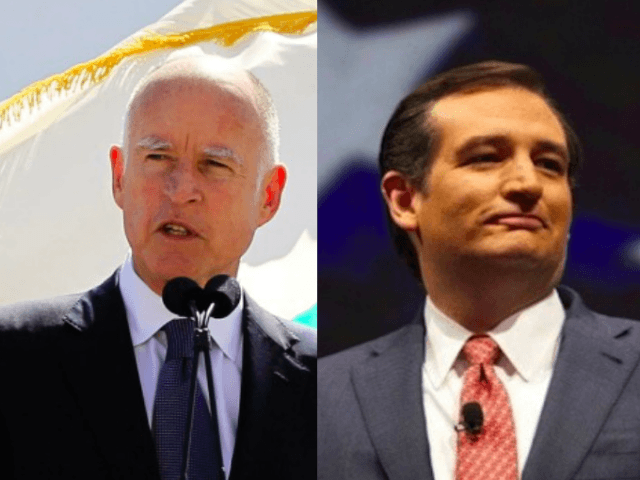NBC News’ Chuck Todd surely knew what he was doing on Sunday morning’s edition of Meet the Press, when he invited California Gov. Jerry Brown to respond to Texas Republican Sen. Ted Cruz’s recent comments on climate change. Todd has long been enthusiastic about the prospects of a Brown run at the presidency in 2016. And Cruz, the scourge of the Beltway establishment, would be a great ideological foil for a contest more interesting than a Bush-vs.-Clinton dynastic rematch.
There are more than a few ironies. Brown, often derided as Governor Moonbeam, would actually be one of the more centrist candidates in today’s Democratic Party. Apart from his obsession with high-speed rail, he is one of his party more sober-minded fiscal managers, and even campaigned in 1992 (against Bill Clinton) on a flat tax. Cruz is a standard-bearer for conservatism, but worked in the George W. Bush administration and could have chosen an “establishment” path.
More broadly, a Brown-vs.-Cruz race would pit the California model against the Texas model (as would a contest between Brown and Cruz’s fellow Texan, Gov. Rick Perry). Where Texas espouses low taxes, limited government, and the most business-friendly climate in the nation, California has embraced high taxes, massive regulation, and an economy that favors high-tech and little else. Texas patrols its border where the feds fail; California welcomes illegal aliens. And so on.
California’s model actually works–so long as the bills for the state’s massive debt, and its enormous pension liabilities, never come due. Americans are voting with their feet for Texas; so, too, are foreign investors that are choosing the Lone Star State over the Golden State. But California’s liberal culture is ascendant, thanks to Hollywood and to a political class in Washington, D.C. that shares its tastes. And California has an ally in the Oval Office who is still “transforming” the country.
A Brown-vs.-Cruz debate would also mean clashes over specific issues. First and foremost is climate change. Brown is a champion of “climate change” alarmism and California’s cap-and-trade system (though he has held out against the anti-fracking movement). Cruz, by contrast, is skeptical of the climate change thesis and the drastic policy recommendations that accompany it, defending fossil fuels as part of the solution for American energy independence and economic growth.
Another issue where the two would clash is on taxes. Brown, unlike many Democrats, believes in balancing budgets–but has soaked the rich in the process, and believes the federal gap must be filled by new revenues rather than spending cuts to existing government programs. Cruz focuses on cutting spending instead, and would certainly point out in any presidential race that America’s economy began recovering in earnest once the Tea Party put the brakes on Washington spending.
The two are also contrasts in character. Brown, who once studied for the priesthood, is the unlikely sober leader of an otherwise libertine state, and the scion of a family political dynasty, the descendant of one of California’s “first families.” Cruz, on the other hand, is from a Cuban immigrant family, and from the Latino community that has given Brown his decisive political advantage in the Golden State–except that he opposes amnesty and virtually every other left-wing policy.
Cruz, who is expected to announce his presidential run, would be one of many exciting candidates in the emerging GOP field. If Brown ran–which he still might, despite denials–he would be one among a few intrepid challengers to Hillary Clinton’s coronation. But he would also be one of the few Democrats with a proven track record, even if Cruz and fellow conservatives would find much in that record to pick apart. It would be a fight beyond the dynasties, and worth watching.

COMMENTS
Please let us know if you're having issues with commenting.